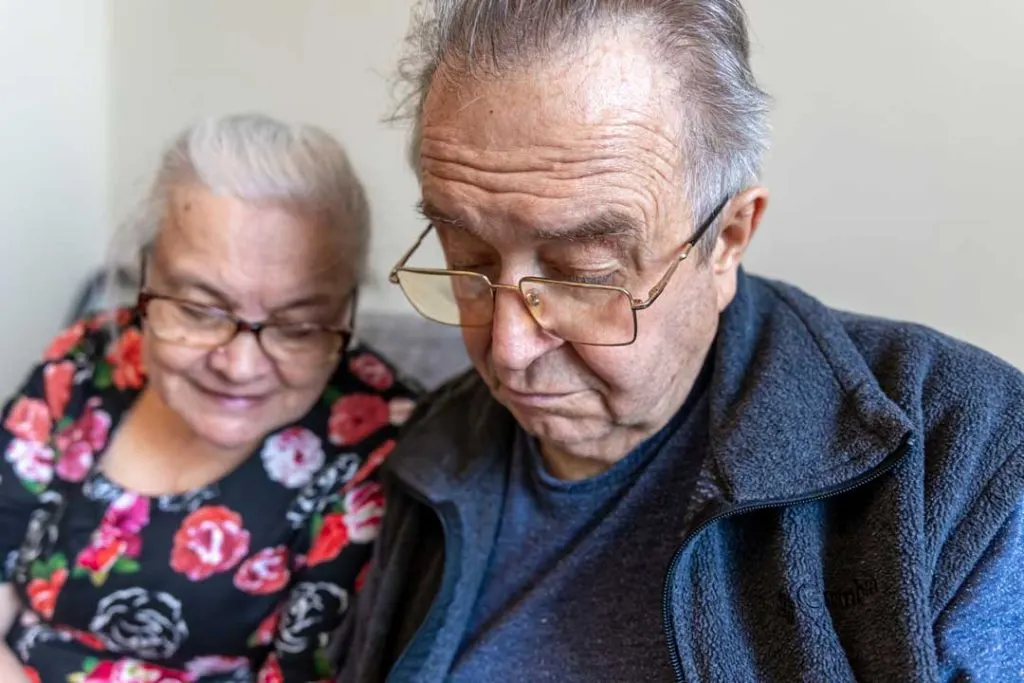A dementia diagnosis brings many questions, and one of the biggest is: how long can a person with dementia live? Understanding the factors that influence progression and the stages before end-of-life can help caregivers prepare for what lies ahead.

Once you see a loved one suffering from dementia, it is natural to think about what future they hold. As dementia is a degenerative condition, it means that with time health of the patient will only worsen. According to current statistics around 7 million people in America are suffering from it.
With the rise in number and no possible medication, it becomes all the more important to find all the relevant information regarding its stages and what to do when the person reaches the last step.
Factors Influencing Dementia Progression

Several factors influence dementia progression, including overall health, age, and type of dementia. If the condition worsens recognizing the most common 10 signs death is near dementia can help you tackle the situation smoothly:
- Type of Dementia: Alzheimer’s disease, the most common form, typically progresses more slowly than other types such as Lewy body dementia.
- Age at Diagnosis: Younger individuals diagnosed with dementia may experience a longer disease course compared to older adults.
- Overall Health: Pre-existing conditions such as heart disease, diabetes, or respiratory issues can shorten life expectancy.
- Quality of Care: Proper medical care, social engagement, and a supportive environment can help slow disease progression.
- Genetics: In some cases, a genetic predisposition may impact the progression rate.
The Stages of Dementia Before Death
Dementia progresses through several stages, each affecting cognitive and physical abilities differently. Understanding the stages of dementia before death can help caregivers provide appropriate care and plan for the future.

1. Early-Stage Dementia (Mild Dementia)
In the early stage, symptoms are mild, and individuals can function relatively independently. They may experience:
- Forgetfulness and difficulty recalling recent events.
- Trouble finding the right words.
- Mild disorientation and confusion.
- Changes in mood or behavior.
- Difficulty managing finances or daily tasks.
Individuals in this stage can live independently with minimal support, but the disease will gradually progress.
2. Middle-Stage Dementia (Moderate Dementia)
As dementia advances, symptoms become more pronounced, requiring increased assistance. Key signs include:
- Significant memory loss, including difficulty recognizing familiar faces.
- Increased confusion about time, place, and events.
- Trouble with complex tasks like cooking or managing medications.
- Changes in sleep patterns, restlessness, or wandering.
- Personality shifts, including aggression, paranoia, or withdrawal.
At this stage, full-time caregiving is often necessary, and the disease’s impact on quality of life becomes more evident.
3. Late-Stage Dementia (Severe Dementia)
In this final stage, individuals require round-the-clock care. Symptoms may include:
- Severe memory loss, with an inability to recognize loved ones.
- Difficulty speaking or communicating effectively.
- Loss of motor functions, leading to trouble swallowing, walking, or sitting up.
- Increased susceptibility to infections like pneumonia.
- Total dependence on caregivers for all daily needs.
This stage is critical in the stages of dementia before death, as the body begins to shut down. Comfort care and palliative support become essential to ensure dignity in the final months or years of life.
End-of-Life Considerations
When a person reaches the late stage of dementia, families and caregivers must prepare for end-of-life care.

Thoughtful planning and compassionate support can ensure dignity, comfort, and peace during this challenging time. Key considerations include:
Palliative Care
Palliative care focuses on enhancing the quality of life by managing pain, addressing discomfort, and ensuring the individual’s emotional and physical well-being. This includes providing proper pain relief, assisting with nutrition and hydration, and managing symptoms such as difficulty swallowing or agitation. Caregivers should work closely with healthcare professionals to tailor care plans that prioritize comfort and minimize distress.
Hospice Services
Hospice care is designed to provide specialized support for individuals in the final stages of dementia. It emphasizes dignity and comfort, rather than curative treatments, ensuring that patients experience as much peace as possible. Hospice teams include doctors, nurses, social workers, and spiritual advisors who work together to provide pain management, emotional support, and guidance for families.
Advance Directives
Planning ahead is crucial to respecting the wishes of a person with dementia. Advance directives, such as living wills and healthcare power of attorney, help ensure that medical decisions align with their preferences. Families should discuss options with legal and medical professionals early on to avoid confusion or difficult decisions in the later stages of the illness.
Emotional and Psychological Support
Watching a loved one go through the final stages of dementia is emotionally challenging. Families may experience grief, stress, and exhaustion. Seeking counseling, joining support groups, or working with hospice professionals can provide emotional relief and guidance. Caregivers must also take care of their mental health to continue providing compassionate support to their loved ones.
How Long Can a Person with Dementia Live? A Caregiver’s Guide
When your loved one is suffering from dementia it becomes crucial to monitor their activities closely and keep track of signs of advancement. The most common signs that can be witnessed with the condition of dementia patients getting worse are – moaning, restlessness, inability to fall asleep, or sweating.
In such cases, caregiving at home might not be an ideal decision. Admitting them to a hospice or senior living can ensure a prolonged and stable life during their end days. Additionally, make sure to check 10 signs death is near dementia to make their last days peaceful.

Jessi is the creative mind behind The Coffee Mom, a popular blog that combines parenting advice, travel tips, and a love for all things Disney. As a trusted Disney influencer and passionate storyteller, Jessi’s authentic insights and relatable content resonate with readers worldwide.
